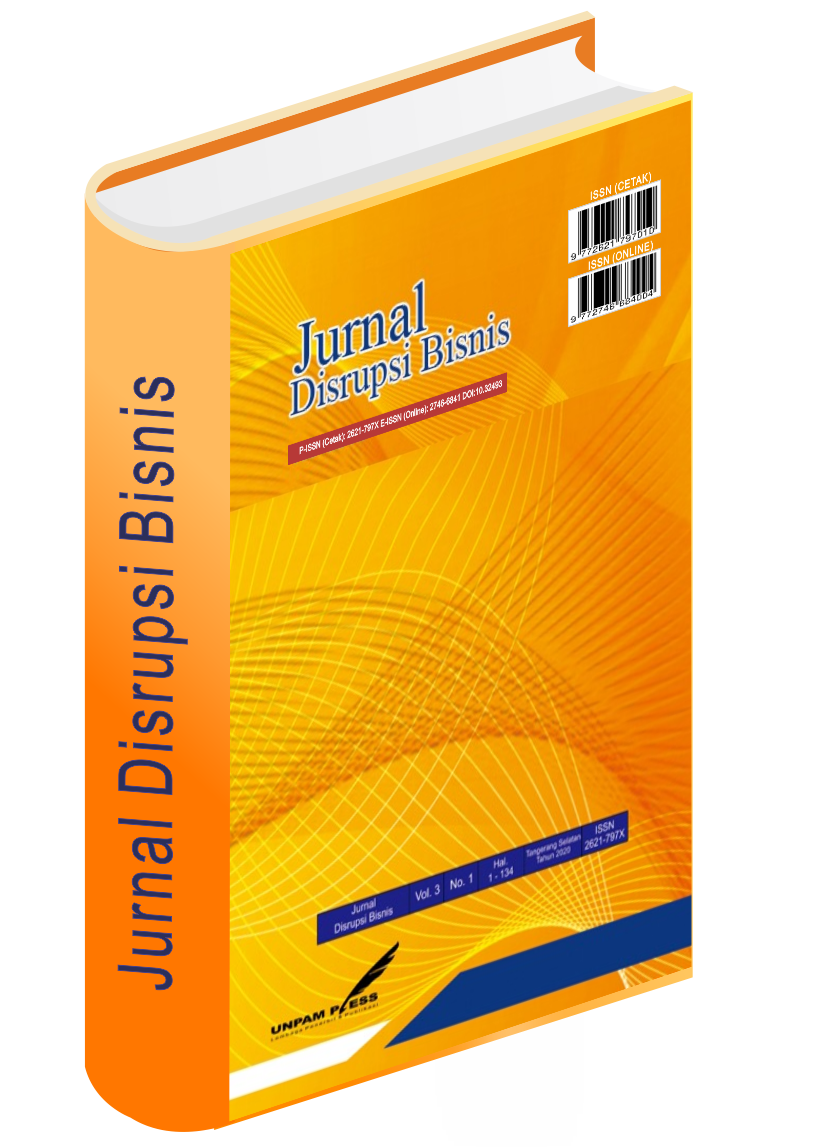Pengaruh Faktor Sosial, Ekspektasi Kinerja, Persepsi Kepercayaan, Persepsi Kemudahan Penggunaan terhadap Minat Memakai Aplikasi Akuntansi
DOI:
https://doi.org/10.32493/drb.v6i5.30581Keywords:
Faktor Sosial, Ekspektasi Kinerja, Persepsi KepercayaanAbstract
Tujuan dari penelitian ini adalah mengetahui bagaimana pengaruh faktor sosial, ekspektasi kinerja, persepsi kepercayaan dan persepsi kemudahan penggunaan terhadap minat memakai aplikasi akuntansi. Metode yang digunakan pada penelitian ini adalah metode kuantitatif. Hasil penelitian menunjukkan bahwa faktor sosial dan ekspektasi kinerja berpengaruh positif terhadap minat memakai aplikasi akuntansi. Sedangkan persepsi kepercayaan dan persepsi kemudahan penggunaan tidak berpengaruh terhadap minat memakai aplikasi akuntansi.
References
Ajzen, I. (1991). The theory of planned behavior. Organizational Behavior and Human Decision Processes, 50(2), 179–211. https://doi.org/https://doi.org/10.1016/0749-5978(91)90020-T
Alhassan, M. D., Kolog, E. A., & Boateng, R. (2020). Effect of gratification on user attitude and continuance use of mobile payment services: a developing country context. Journal of Systems and Information Technology, 22(4), 351–378. https://doi.org/10.1108/JSIT-01-2020-0010
Alomari, A. S. A., & Abdullah, N. L. (2023). Factors influencing the behavioral intention to use Cryptocurrency among Saudi Arabian public university students: Moderating role of financial literacy. Cogent Business & Management, 10(1), 2178092. https://doi.org/10.1080/23311975.2023.2178092
Asnawati, Nadir, M., Wardhani, W., & Setini, M. (2022). The effects of perceived ease of use, electronic word of mouth and content marketing on purchase decision. International Journal of Data and Network Science, 6(1), 81–90. https://doi.org/10.5267/J.IJDNS.2021.10.001
Astiyah, A., & Budiantara, M. (2023). Faktor-Faktor Yang Mempengaruhi Minat Pelaku Umkm Untuk Menggunakan Aplikasi Akuntansi Berbasis Seluler Di Dusun Bugel Sampang Kabupaten Cilacap. Jurnal Akuntansi Dan Keuangan, 28(1), 76–86. https://doi.org/10.23960/jak.v28i1.792
Beh, P. K., Ganesan, Y., Iranmanesh, M., & Foroughi, B. (2021). Using smartwatches for fitness and health monitoring: the UTAUT2 combined with threat appraisal as moderators. Behaviour & Information Technology, 40(3), 282–299. https://doi.org/10.1080/0144929X.2019.1685597
Chen, L., Jia, J., & Wu, C. (2023). Factors influencing the behavioral intention to use contactless financial services in the banking industry: An application and extension of UTAUT model. Frontiers in Psychology, 14. https://doi.org/10.3389/fpsyg.2023.1096709
Davis, F. D. (1989). Perceived Usefulness, Perceived Ease of Use, and User Acceptance of Information Technology. MIS Quarterly, 13(3), 319–340. https://doi.org/10.2307/249008
Dinas Koperasi dan UKM DIY. (2021). Peta UKM DIY Per Kalurahan. Https://Sibakuljogja.Jogjaprov.Go.Id/Publik/Diy_map.Php.
Ghozali, I. (2018). Aplikasi Analisis Multivariate Dengan Program IBM SPSS 25 Edisi Ke-9. http://slims.umn.ac.id//index.php?p=show_detail&id=19545
Hakim, M., & Nurkamid, M. (2017). Model Adopsi Ukm Di Kudus Terhadap E-Commerce. Simetris : Jurnal Teknik Mesin, Elektro Dan Ilmu Komputer, 8, 339. https://doi.org/10.24176/simet.v8i1.974
Kar, A. K., & Kushwaha, A. K. (2021). Facilitators and Barriers of Artificial Intelligence Adoption in Business – Insights from Opinions Using Big Data Analytics. Information Systems Frontiers. https://doi.org/10.1007/s10796-021-10219-4
Laudon, K. C. ;, & Jane, P. L. (2014). Sistem Informasi Manajemen : Mengelola Perusahaan Digital (13th ed.). Jakarta : Salemba Empat .
Noviyanti, A., & Erawati, T. (2021). Pengaruh Persepsi Kemudahan, Kepercayaan Dan Efektivitas Terhadap Minat Menggunakan Financial Technology (Fintech) (Studi Kasus: Umkm Di Kabupaten Bantul). Jurnal Ilmiah Akuntansi Dan Finansial Indonesia, 4(2), 65–74. https://doi.org/10.31629/jiafi.v4i2.3253
Prasetyo, R. G. A. (2021). Analisis Faktor-Faktor Yang Mempengaruhi Minat Penerapan Aplikasi Akuntansi Berbasis Seluler Pada UMKM Di Daerah Istimewa Yogyakarta.
Rahardja, U., Hapsari, I. D., Putra, P. O. H., & Hidayanto, A. N. (2023). Technological readiness and its impact on mobile payment usage: A case study of go-pay. Cogent Engineering, 10(1), 2171566. https://doi.org/10.1080/23311916.2023.2171566
Rakhmawati, S. (2013). Penggunaan Sistem Internet Banking Pada Nasabah Bank Muamalat Cabang Pembantu Madiun. In ASSETS: Jurnal Akuntansi dan Pendidikan (Vol. 2, Issue 2).
Rogers, E. M. (2010). Diffusion of innovations. Simon and Schuster.
Rohmah, K. L., & Arisudhana, A. (2022). Pengaruh Karakteristik Kewirausahaan, Bantuan Pemerintah, Penggunaan Teknologi Dan Manajemen Krisis Terhadap Ketahanan Umkm Pada Masa Pandemi Covid-19 Di Kabupaten Sleman. Jurnal Riset Akuntansi Mercu Buana, 8(1), 1–13. https://doi.org/https://doi.org/10.26486/jramb.v8i1.2086
Thompson, R. L., Higgins, C. A., & Howell, J. M. (1991). Personal Computing: Toward a Conceptual Model of Utilization. MIS Quarterly, 15(1), 125–143. https://doi.org/10.2307/249443
Venkatesh, V., Morris, M. G., Davis, G. B., & Davis, F. D. (2003). User Acceptance of Information Technology: Toward a Unified View. MIS Quarterly, 27(3), 425–478. https://doi.org/10.2307/30036540
Venkatesh, V., Thong, J. Y. L., & Xu, X. (2012). Consumer Acceptance and Use of Information Technology: Extending the Unified Theory of Acceptance and Use of Technology. MIS Quarterly, 36(1), 157–178. https://doi.org/10.2307/41410412
Viana Pereira, F., Tavares, J., & Oliveira, T. (2023). Adoption of video consultations during the COVID-19 pandemic. Internet Interventions, 31, 100602. https://doi.org/https://doi.org/10.1016/j.invent.2023.100602
von der Assen, L. (2023). Digitalization as a Provider of Sustainability?—The Role and Acceptance of Digital Technologies in Fashion Stores. Sustainability (Switzerland), 15(5). https://doi.org/10.3390/su15054621
Wu, I.-L., Chiu, M.-L., & Chen, K.-W. (2020). Defining the determinants of online impulse buying through a shopping process of integrating perceived risk, expectation-confirmation model, and flow theory issues. International Journal of Information Management, 52, 102099. https://doi.org/https://doi.org/10.1016/j.ijinfomgt.2020.102099
Downloads
Published
How to Cite
Issue
Section
License
Penulis yang menerbitkan jurnal ini menyetujui persyaratan berikut:
- Penulis memiliki hak cipta dan memberikan jurnal hak publikasi pertama dengan karya yang secara simultan dilisensikan di bawah Creative Commons Attribution License yang memungkinkan orang lain untuk berbagi karya dengan pengakuan kepengarangan karya dan publikasi awal dalam jurnal ini.
- Penulis dapat masuk ke dalam pengaturan kontrak tambahan yang terpisah untuk distribusi non-eksklusif versi jurnal yang diterbitkan dari karya tersebut (misalnya, mempostingnya ke repositori institusional atau menerbitkannya dalam sebuah buku), dengan pengakuan atas karya awalnya publikasi dalam jurnal ini.
- Penulis diizinkan dan didorong untuk memposting pekerjaan mereka secara online (misalnya, dalam repositori institusional atau di situs web mereka) sebelum dan selama proses pengajuan, karena dapat menyebabkan pertukaran yang produktif, serta kutipan yang lebih awal dan lebih besar dari karya yang diterbitkan ( Lihat The Effect of Open Access).

This work is licensed under a Creative Commons Attribution-NonCommercial 4.0 International License.







.png)

